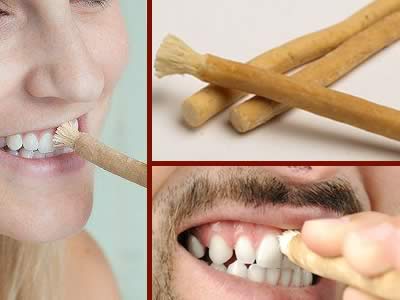miswak (Arak, Salvadora persica) has been used as a natural toothbrush for cleaning teeth for centuries in Middle East.
Arak is a short evergreen tree. A miswak is a fibrous stick prepared from the arak tree. A miswak may be made of branches instead of its roots, though roots are better.
It is said that the miswak strengthens the gums, prevents tooth decay and eliminates toothaches. It is also said to halt further increase in decay. Research found that miswak contains a number of medically beneficial properties, including abrasives, antiseptics, astringent, detergents, enzyme inhibitors, and fluoride, which help clean and protect the teeth and gums. In 2003, scientists compared the use of miswak with ordinary toothbrushes, and found that the results clearly were in favor of the miswak users. In 1986, WHO (World Health Organization) recommended miswak for oral hygiene use.
A miswak has a pungent smell. It is said that a miswak creates a fragrance in the mouth, eliminates bad breath, improve the sense of taste and cause the teeth to glow and shine. This may explain why the miswak is recommended to be used before religious practice. It is said that, the Prophet Mohammad, founder of Islam, recommended his followers to use it at the time of every Prayer, “it is the purification for the mouth and a means of the pleasure of the Lord”. This practice today is still popular in Arabia.
Recent years, there are miswak products, such as toothpaste made from miswak extract, in the markets in the Middle East, Asia, Europe and North America. You may find a miswak toothpaste in a health supplement store.
For more information about natural remedies and alternative treatment for teeth and dental care, go to Natural Remedies Center: http://www.naturalremediescenter.com/treat/toothache/



